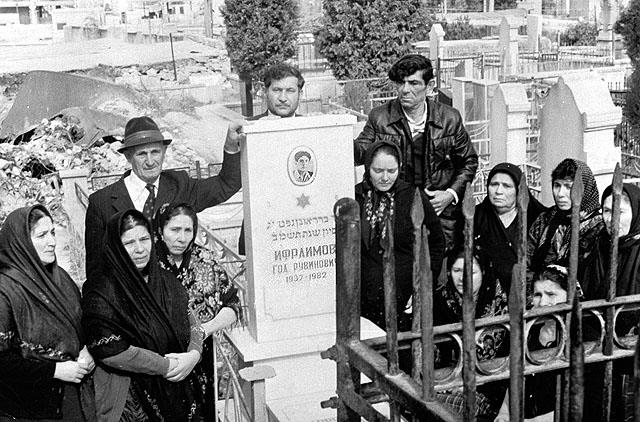
Baku, Azerbaijan (USSR) 1981.
(The Oster Visual Documentation Center, Beit Hatfutsot,
courtesy Tamara Michaelov, Israel)
Baku
(Place)Baku
A port on the western shore of the Caspian Sea, capital of Azerbaijan from 1920.
A community of Persian Jews existed in Baku in the 18th century. The inhabitants, who were Muslims, harassed the Jews there and in 1814 threatened their lives following a blood libel. Although the Russian authorities offered them their protection, the Jews left and took refuge in Kuba, also in the province of Baku, where there was a large community of Caucasian mountain Jews. Later, however, some returned to Baku. A new chapter in the history of the community began in the 1870s with the development of the oil industry in Baku and its surroundings. Although restrictions were imposed to discourage Jews coming from European Russia, and on Jewish participation in the industry, the number of Jewish concessionaires and professional and skilled workers increased. Jews took a large share in initiating new enterprises; and providing capital, in exploiting oil wells and setting up refineries, in developing transport facilities, and in marketing oil and oil products within Russia and abroad.
Among pioneer industrial companies owned by Jews was that of Dembo and Kagan, founded by A. Dembo of Kovno and Chayyim Cohen of Brest-Litovsk. Also active in this sphere were the Dembot Brothers, in collaboration with Baron H. Guenzburg, Bikhowsky, Leites, Ickowich, and A. M. Feigel. A central position in oil exploitation, transportation, and marketing was occupied by the Rothschilds, who founded the Caspian-Black Sea Company and by the end of the 19th century headed a syndicate of many of the large oil companies. Another large company was Polak and Son, owned by Grigori Polak and his sons Saveli (Shevach) and Michael. Prominent in the field of technology was the chemical engineer Arkadi Beilin, who worked in a number of companies, including those of the Rothschilds, and after marrying the daughter of Grigori Polak joined Polak and Sons. In 1913-14 the share of the Jewish companies in kerosene production in Baku reached 44% while the proportion of Jews occupied in oil products marketing was even greater.
Jewish communal and Zionist institutions followed in the wake of the economic development. According to the 1897 census there were 2,341 Jews in Baku, of whom the majority were Caucasian with some from European Russia. The Jewish population continued to increase after the 1917 revolution through the influx of mountain Jews who, deprived of their traditional livelihoods in the villages, moved to the towns. In 1926 the Jewish population numbered 21,955 (19,583 of European origin, 1,985 Caucasian Jews, and 427 Georgian Jews). According to the 1959 census it numbered 29,179 (3% of the total) in Baku and its vicinity. In 1970 the Jewish population was estimated at 80,000 (60,000 of European origin, the rest Tati, Georgian, and Bukharan). Most of the non-European Jews reside in the old part of the city. The European, Tati, and Georgian communities each have their synagogue. The Tati synagogue is the oldest and largest. While matzot can be obtained on Passover, ritually-slaughtered meat is not available. Two local rabbis signed Izvestia's denunciation of the Sinai campaign (on November 29, 1956). It appears that since that time the European Jewish community has been deprived of its rabbis who have not been replaced.
Since 1986, 24,650 Azeri Jews have immigrated to Israel.
In 1997 there were 30,000 Jews living in Azerbaijan, 20,000 0f them in Baku.